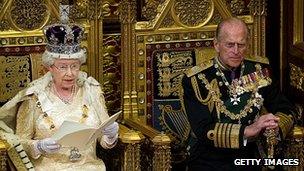Queen's Speech: New measures to boost economy
- Published

Shareholders would get more powers under the legislation outlined
New measures designed to boost economic growth have been outlined in the Queen's Speech, including cutting regulation on businesses.
The government announced proposals to increase shareholder power, particularly regarding executive pay.
It also said it would launch a Green Investment Bank to provide investment in environmental initiatives.
The Enterprise and Regulatory Reform Bill would "create the right conditions for economic recovery".
It would also "reduce regulatory burdens and improve business and consumer confidence".
The government also outlined the Banking Reform Bill, designed to strengthen regulation in the financial services industry.
"On balance, business will welcome some of the government's proposed legislative measures, but express serious reservations about others," said John Longworth, director general of the British Chambers of Commerce.
"Positive steps such as reform to employment tribunals and red tape reductions could be undermined by complex new burdens around shared parental leave, for example. Ministers could have been bolder."
Red tape
Under the proposals, shareholders would be able to vote down directors' pay they deemed excessive. Currently, they only have a non-binding vote on remuneration.
"The government will amend company law so that shareholder votes on big businesses' prospective remuneration plans for executives will be binding," said the ǵüµÇ¨û§'s business editor Robert Peston.
He added that Business Secretary Vince Cable had not yet decided on the voting threshold to force change.
Mr Cable told the ǵüµÇ¨û§: "There is a lot of anger around at the way in which some executives, not all, are being paid way in excess of their company's performance, and investors - in many cases insurance companies and pension funds representing millions of people - are becoming more active. That's healthy, that's how this problem should be dealt with".
The proposals come as a number of UK firms, such as Aviva, Barclays, William Hill and Premier Foods, have faced shareholder revolts on executive pay.
The new bill also includes measures to remove "unnecessary legislation", helping businesses to save time and money, and measures to help employers hire new staff and resolve disputes in the workplace more quickly.
The bill would also create a single Competition and Markets Authority by merging the Competition Commission and certain functions of the Office of Fair Trading.
The bill will apply to the whole of the UK, but with some parts relevant to England, Wales and Scotland only.
Taxpayer burden
The Banking Reform Bill would "foster financial stability and a more resilient banking sector", the government said.
It would give the Treasury the power to ring-fence retail operations from investment divisions of big banks, and to ensure that depositors are paid out before unsecured creditors in the case of any bank insolvency.
This, the government said, would reduce the potential burden on the taxpayer.
The measures included in the bill are based on recommendations made by the Independent Commission on Banking, set up by the government in 2010 to look at reforms in the banking sector in the wake of the financial crisis.
The Queen's speech also included the Groceries Code Adjudicator Bill, which is designed to ensure supermarkets deal "fairly and lawfully" with suppliers.
It also included the Energy Bill, designed to boost investment in low carbon energy and help increase security of supply.